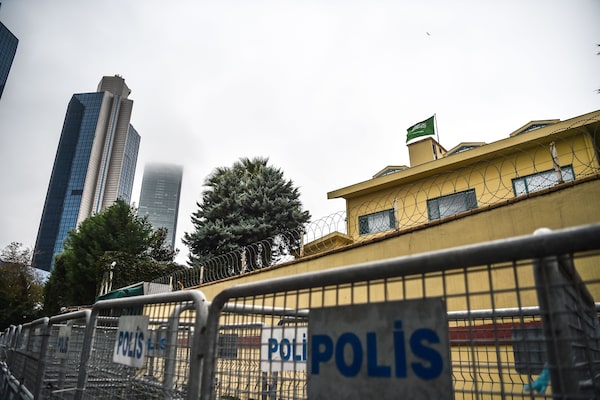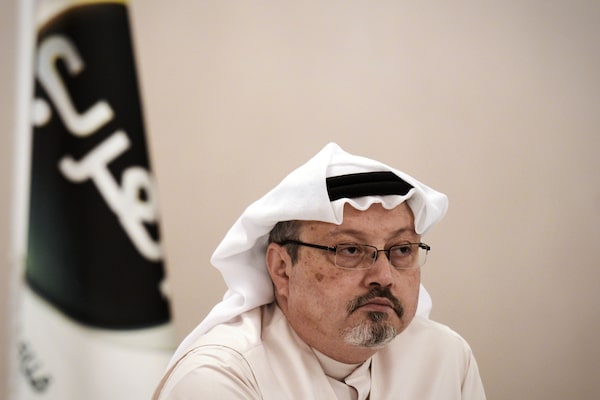
A view of the Saudi Arabian consulate in Istanbul on October 14, 2018.OZAN KOSE/AFP/Getty Images
Saudi Arabia lashed out at its critics on Sunday and vowed it would respond to sanctions or other punitive steps “with even greater action” as pressure continued to mount on the kingdom over the disappearance and alleged murder of journalist Jamal Khashoggi.
The warning, published by the official Saudi Press Agency, came hours after U.S. President Donald Trump, in an interview with 60 Minutes, said there would be “severe punishment” if it was determined that Mr. Khashoggi had been murdered inside the Saudi consulate in Istanbul, as the Turkish government claims.
Mr. Khashoggi, a journalist who was sharply critical of Saudi Arabia’s de facto ruler, Crown Prince Mohammed bin Salman, has not been seen since Oct. 2. Video footage shows him entering the Saudi consulate in Istanbul that day, where he reportedly hoped to secure a document that would allow him to marry his Turkish fiancée.

Jamal Khashoggi is seen in this 2014 file photo.MOHAMMED AL-SHAIKH/AFP/Getty Images
Explainer: Mr. Khashoggi has been missing since Oct. 2. Here’s what we know so far
Turkish officials have said they believe Mr. Khashoggi, who would have celebrated his 60th birthday on Saturday, was killed and dismembered inside the consulate. There are reportedly audio and video recordings of the alleged murder that have not yet been made public.
Turkish media have published photographs of 15 Saudi nationals – one of whom has been identified as an intelligence officer, another as a forensics expert – who are suspected of having been dispatched specifically to carry out the alleged killing. They arrived in Istanbul by private plane on Oct. 2 and left later the same day.
CCTV footage obtained by Turkish media shows Saudi journalist Jamal Khashoggi entering the consulate in Istanbul on October 2, alongside his fiancee outside, and the movements of Saudi nationals believed to be linked to his disappearance.
Reuters
Sunday’s statement by the Saudi government called the claims a “campaign of false allegations and falsehoods.”
“The kingdom affirms its total rejection of any threats and attempts to undermine it, whether by threatening to impose economic sanctions, using political pressures, or repeating false allegations that will not undermine the kingdom and its staunch positions,” the statement reads. “The kingdom also affirms that if it receives any action, it will respond with greater action, and that the kingdom’s economy has an influential and vital role in the global economy.”
On Sunday, Britain, Germany and France issued a joint call for a “credible investigation” into what happened to Mr. Khashoggi.
Foreign Affairs Minister Chrystia Freeland echoed that sentiment: “Canada strongly supports our allies on this important issue,” she tweeted.
Several hours after the Saudi statement – in an apparent effort to avoid further aggravating Mr. Trump – the kingdom’s embassy in Washington posted a semi-apologetic addendum on its Twitter account: “The Kingdom of Saudi Arabia extends it appreciation to all, including the U.S. administration, for refraining from jumping to conclusions on the ongoing investigation.”
In a sign that the Saudi monarch may be seeking to lower the temperature, the country’s Ministry of Foreign Affairs later reported that King Salman bin Abdulaziz called Recep Tayyip Erdogan and thanked the Turkish leader for accepting the idea of forming a joint working group into Mr. Khashoggi’s disappearance – adding that no one will undermine brotherly relations between the two countries.
Mr. Trump was initially reluctant to confront Saudi Arabia over the fate of Mr. Khashoggi, who lived in self-imposed exile in the United States and was a regular contributor to the Global Opinions section of the Washington Post. On Saturday, Mr. Trump told reporters that it would be “very foolish for our country” if the United States cancelled an agreement to sell US$110-billion worth of weapons to Saudi Arabia, as critics – and even some influential Republican senators – have demanded.
“I actually think we’d be punishing ourselves if we did that,” Mr. Trump said. “There are other things we could do that are very, very powerful, very strong, and we’ll do that.”
Mr. Trump has close ties to the extended Saudi royal family, which has invested millions of dollars in Trump-branded real estate properties in the United States and around the world. Mr. Trump, who made Riyadh his first foreign stop after coming to office last year, has refrained from criticizing Saudi Arabia over its involvement in the war in Yemen – a brutal conflict that has left tens of thousands of people dead – or its disputes with Qatar and Canada.
Marco Rubio, a Florida senator who ran against Mr. Trump in 2016, told CBS’s Face the Nation program on Sunday that U.S.-Saudi relations – including the arms sale – would have to be “completely revised” if Saudi Arabia was shown to have assassinated Mr. Khashoggi.
Mr. Rubio said Treasury Secretary Steven Mnuchin should stay away from an investment conference known as “Davos in the Desert” that Riyadh is scheduled to host later this month.
The conference is seen as a showcase for Crown Prince Mohammed’s ballyhooed efforts to reform the ultraconservative kingdom, a push which has included allowing the reopening of cinemas, as well as permitting women to drive. But the reforms have come alongside a major crackdown on dissent, including the arrests of hundreds of businessmen, religious figures and women’s rights activists.
The heads of several major companies, including Richard Branson of Virgin Group, Dara Khosrowshahi, chief executive of Uber Technologies Inc., JP Morgan & Chase Co. CEO Jamie Dimon and Ford Motor Co. chairman Bill Ford have said they wouldn’t attend the Riyadh meeting under current circumstances.
Mr. Khashoggi’s fiancée, Hatice Cengiz, added her voice to the international outcry on Saturday. “Jamal spoke up against oppression, but he paid for the Saudi people’s demand for freedom with his own life,” she wrote in a New York Times piece. “His loss is not just mine but that of every person with a conscience and moral compass. If we have already lost Jamal, then condemnation is not enough.”
– With a report from Gloria Galloway
 Mark MacKinnon
Mark MacKinnon